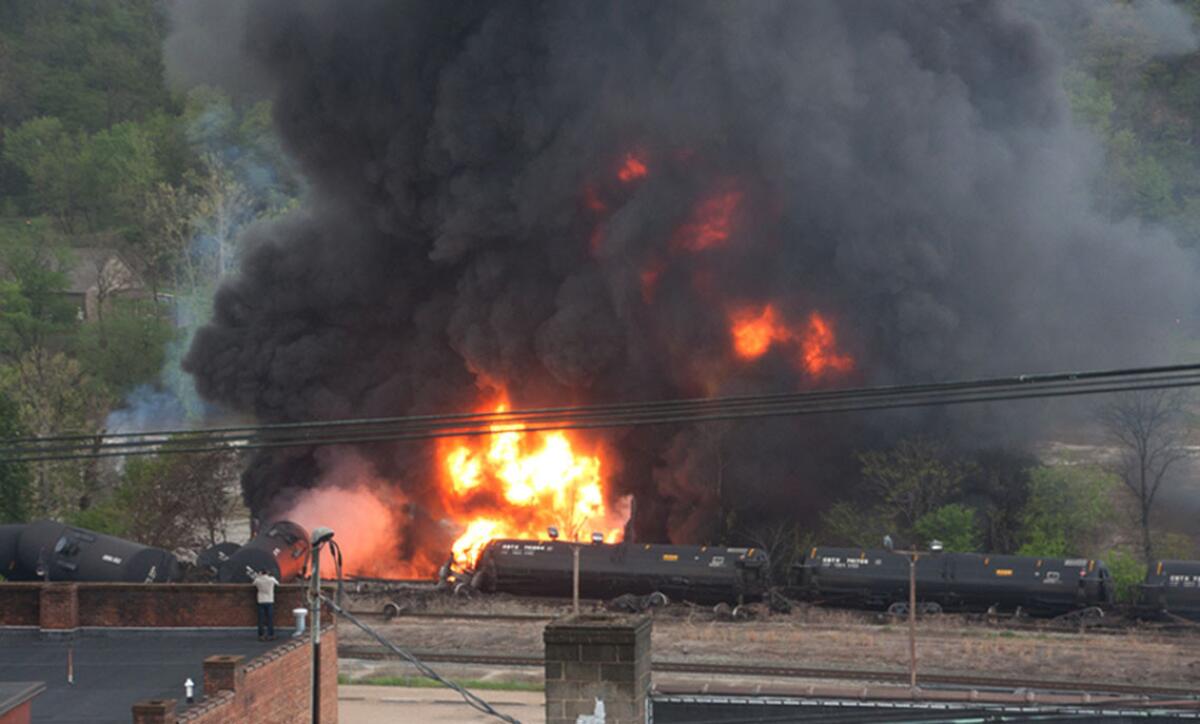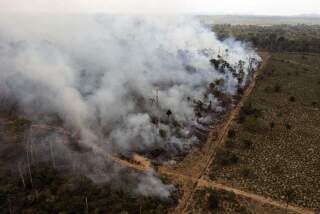Op-Ed: Trains and crude oil are too often an accident waiting to happen

The fiery derailment in Virginia recently of a train transporting oil was the latest in a series of alarming accidents involving oil transport in North America in the last year. In 2013, more oil spilled from U.S. trains than in the previous four decades combined — and that doesn’t include a Canadian spill that incinerated the downtown core of Lac-Megantic in Quebec last year, killing 47.
We can expect such serious accidents to continue if immediate changes are not made. Nationally, the transport of oil by rail is on a steep upward trajectory, largely due to fracking in North Dakota and to drilling in Canada’s Alberta tar sands. And much of the oil being transported is especially dangerous, containing high levels of extremely volatile and combustible vapors. In recent testimony before Congress, the rail industry made clear that many of the cars carrying this type of crude are not equipped to do so safely.
California is in the cross hairs of this dangerous situation. The state is projected to receive up to 150 million barrels of oil by rail by 2016, compared with just 2 million barrels in 2011, and much of that oil will be volatile crude from the Bakken region of North Dakota and Canada.
According to the California Energy Almanac, the state’s refineries unloaded 1.41 million barrels of oil imported by rail in the first quarter of this year, twice as much as in the same period during 2013. Already the third-largest oil refining state, California faces six potential new rail offloading terminals, as well as refinery expansion to accommodate the increase in North American oil production.
North Dakota’s Mineral Resources Department estimates that as much as 90% of that state’s crude is expected to move by rail this year, much of it to California’s refineries and ports in the San Francisco Bay Area, Los Angeles and the Central Valley. The freight routes pass through populous parts of cities including Richmond, Oakland and Berkeley in the north and Los Angeles and Long Beach in the south.
The federal Department of Transportation has ordered railroads to alert state officials about large shipments of Bakken crude moving through their states. It also has urged railroads to use their strongest rail cars for carrying the volatile oil.
But more is needed. Many local governments and citizens feel powerless to prevent these trains from moving through their towns. While some cities, such as Berkeley and Richmond, have passed resolutions intended to protect residents from crude being transported by rail, the ability of states and cities to directly regulate rail transportation is limited by federal law, which trumps conflicting or overlapping state and local rail regulations. States and cities have no authority over routing or rail car design, for example.
The Department of Transportation is working on more stringent regulations for rail car design, but it should also consider other rules and policies, including rerouting oil trains to avoid population centers, sources of drinking water and fragile ecosystems.
California also has a role to play. The state should begin taxing all oil imports, delivered by any mode of transportation, and use the revenue to support emergency response equipment and training at the state and local levels, particularly in areas most affected by rail traffic. The state should establish a system to convey this new railroad shipment information to local emergency personnel.
The state should also call on the California Public Utilities Commission to identify areas of railroad track that qualify as “essentially local safety hazards,” a narrow exception to the preemption provisions of the Federal Rail Safety Act that allows for more stringent state regulation in areas with unique, high-risk characteristics.
The state should also clarify the responsibilities of multiple agencies involved in safety and environmental oversight, including the Public Utilities Commission, the Governor’s Office of Emergency Services, the California Environmental Protection Agency and the Office of Spill Prevention and Response.
Local government and permitting agencies in the state should also consider denying land-use and other permits for refineries and offloading facilities if they find safety risks or improper environmental mitigation under statutes like the California Environmental Quality Act.
And community members should become involved, commenting in environmental review processes for proposed refinery and terminal expansions and supporting the ultimate remedy: reducing reliance on fossil fuels by promoting renewable energy, energy efficiency and smart growth.
The increase in oil transported by rail is a symptom of our ongoing dependence on oil; we need to make changes that both enhance short-term safety and pave the way for a clean energy future.
Jayni Foley Hein is executive director of the Center for Law, Energy and the Environment at UC Berkeley School of Law.
More to Read
A cure for the common opinion
Get thought-provoking perspectives with our weekly newsletter.
You may occasionally receive promotional content from the Los Angeles Times.






